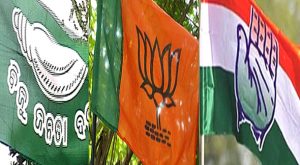Caste census takes centre stage: BJD, Cong claim credit; BJP asserts move not driven by oppn demands

Bhubaneswar: The ruling BJP in Odisha Thursday firmly rejected allegations that it acted under pressure from opposition parties like the BJD and the Congress in approving the inclusion of caste enumeration in the upcoming national census.
In separate press conferences, leaders from both the BJD and Congress claimed that the Centre’s decision was the result of their longstanding demands.
Congress workers, led by OPCC president Bhakta Charan Das, celebrated the development with a ‘Vijay Utsav’ at the party’s state headquarters on Thursday evening.
Both parties took credit for Wednesday’s decision by the Cabinet Committee on Political Affairs (CCPA) to include a caste survey in the next census. They maintained that the Centre had “bowed to pressure.”
“Our leader Rahul Gandhi has been advocating for the caste-based census since a long time, both in Parliament and outside. They (BJP) criticised our leader and dismissed his arguments. But, now they have been forced to accept our demand,” OPCC president Bhakta Charan Das said.
He criticised the NDA for taking a decade to take the decision.
Das also took aim at the previous BJD government, which remained in power in Odisha for 24 years.
He noted that although the OBC population in the state is around 54 per cent, they receive only 11.27 per cent reservation in government recruitment.
He further expressed concern over the lack of OBC reservation in the education sector.
In a separate press conference, BJD leaders Sanjay Das Burma, Arun Kumar Sahoo, and Snehangini Chhuria emphasised that former Chief Minister Naveen Patnaik had been demanding a caste-based census since 2010.
“The recent decision of the Centre to go for caste enumeration is a result of our leader’s consistent efforts,” the BJD said in an official statement.
BJD MLA and former minister Arun Kumar Sahoo said Patnaik had first envisioned the idea of conducting a caste enumeration in the country.
“The Centre was finally forced to go for caste enumeration only because of the pressure mounted on them,” Sahoo said.
BJD leader and former minister Snehangini Chhuria said, “Although the central government has agreed for the caste-based census, it should not be used as an election stunt. Everyone knows that the central government had opposed it earlier. Now that it is announced, there should be sincere steps to use it to ensure social justice for all sections.”
She said a caste-based census can ensure proper reservation not just for SCs and STs, but also for OBCs, thereby helping establish social justice in the country.
However, senior BJP leader and Bhubaneswar MP Aparajita Sarangi rejected the allegations of the Congress and the BJD.
“There is no pressure on Prime Minister Narendra Modi. Everybody knows that the BJP government does not work under pressure from anybody. The decision to go face a caste enumeration is taken at the appropriate time,” Sarangi said.
“Our government is very much committed to the welfare of the vulnerable, deprived people of all castes. This is a very much considered decision of the government and will be a significant milestone,” the Bhubaneswar MP said.
Addressing questions about the timing of the announcement ahead of the Bihar elections, Sarangi said, “There’s nothing political about the timing. Look at it positively. If elections were the motive, the BJP could have made this move before the 2019 or 2024 general elections.”
Meanwhile, BJD leader Arun Kumar Sahoo said caste data is essential for inclusive development across all sections of society.
“Since reservations are currently based on caste, a proper census can help improve the reservation system,” he said.
In Odisha, SC and ST communities together make up around 38.75 per cent of the population, while OBCs constitute about 54 per cent, the BJD leader claimed, adding that OBCs receive only 11.2 per cent reservation in jobs and none in education.
“The BJD demands that reservations be proportional to population, which would require revising the current legal cap of 50 per cent on total reservations,” he said.
PTI
News